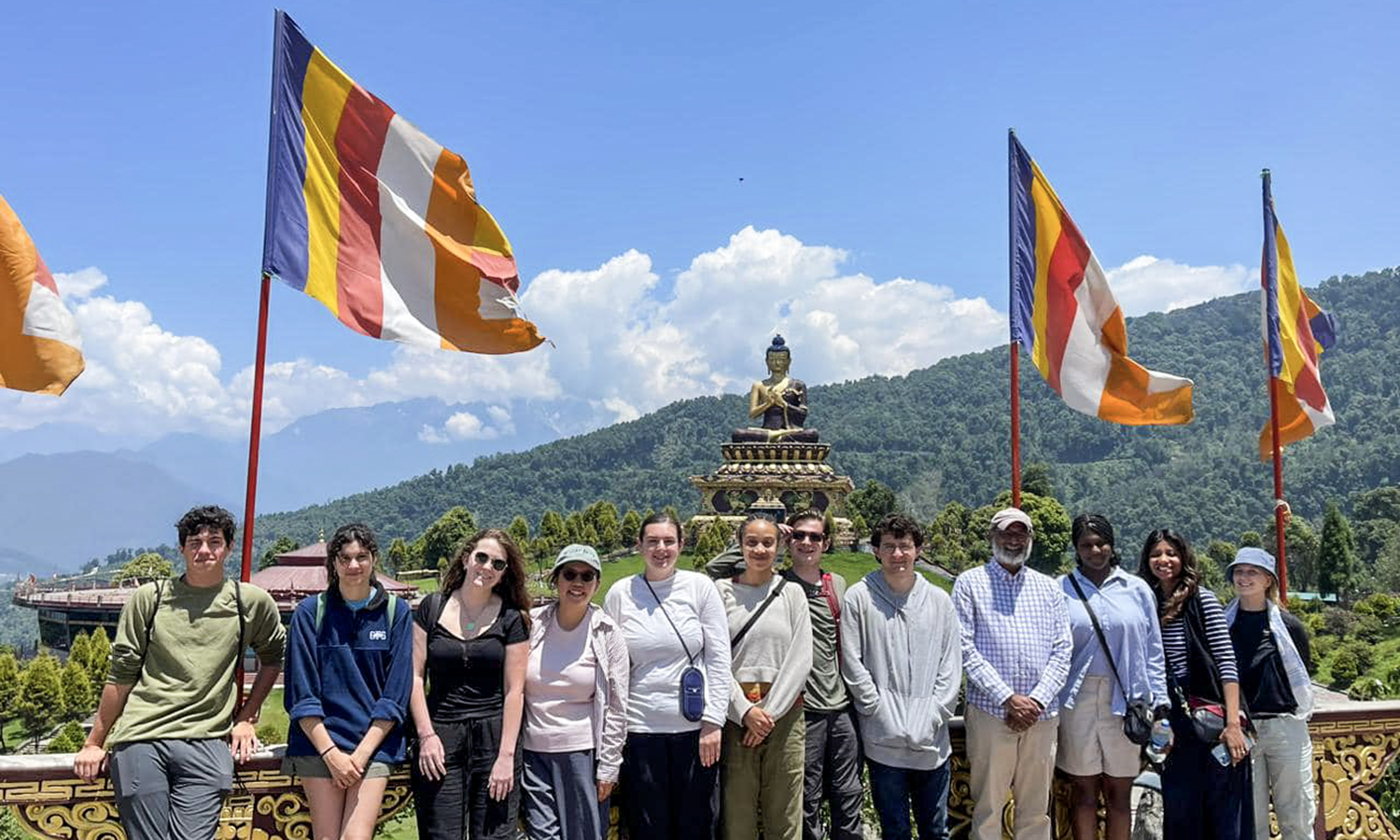
HWS News
26 June 2023 HWS Abroad in India
Students recently completed an HWS-led summer abroad program in Northeast India.
Led by Professor of International Relations and Asian Studies Vikash Yadav, students completed a busy three-week study abroad program to Northeast India, where they visited cities including Kurseong, Rinchenpong, Pelling, Yuksom, Ravangla, Gangtok and Dzongu.
Titled “Himalayan Challenges: Environment, Labor and Politics,” the course examined sustainable development in a global economy through visits to nongovernmental organizations, cultural sites, schools and farms. They also met with academics, activists and farmers.
The state of Sikkim is the first territory to move entirely to organic agriculture in India, banning the use of pesticides, chemical fertilizers and single-use plastic items. Through homestays and connecting with people in the region, students witnessed how these actions have promoted biodiversity as well as posed challenges for economic development, Yadav explains.
“The highlight of the trip was our stay with the indigenous Lepcha community in the restricted access Dzongu forest region of North Sikkim,” Yadav says.
“In the evenings, students listened to Lepcha folk musicians, learned to cook the local cuisine, and engaged with activists who have led one of the most successful, non-violent, anti-hydroelectric dam movements in the world. The experience of living with the Lepcha also helped students to better contextualize a semester’s worth of readings on the colonial-era history, contemporary politics, social dynamics, and environmental policies in Sikkim and Gorkhaland.”
HWS Abroad in India
 Students embark on a 3 hour hike at Makaibari Tea Estate.
Students embark on a 3 hour hike at Makaibari Tea Estate. Students gather for a group photo.
Students gather for a group photo. Students view India Gate in Delhi, India.
Students view India Gate in Delhi, India. The group takes in the view near the Yangsum Heritage Farm in Rinchenpong, Sikkim.
The group takes in the view near the Yangsum Heritage Farm in Rinchenpong, Sikkim. Kinzong Bhutia, of the Kanchendzonga Conservation Committee, talks with students about the organization’s educational efforts in Yuksom, Sikkim.
Kinzong Bhutia, of the Kanchendzonga Conservation Committee, talks with students about the organization’s educational efforts in Yuksom, Sikkim. Students and Professor of International Relations Vikash Yadav gather for a photo at Buddha Park in Ravangla, Sikkim.
Students and Professor of International Relations Vikash Yadav gather for a photo at Buddha Park in Ravangla, Sikkim.
William Koepp '23 says staying in homestays, connecting with activists and learning about Sikkim's commitment to environmental policies gave him new perspective on, "how I can exist alongside the environment. It has made me reconsider what truly should be the goal of development and — just as vitally — the relationship between our modern needs and forever remaining conscious on how our attempts to fulfill them strain the environment," he says.
Additional agricultural visits included the Makaibari Tea Estate & Factory in Kuersong, Darjeeling and Azim’s Model Farm & Wine Making in Rinchenpong to taste local wines. In Rinchenpong, they also visited the local National Rural Employment Guarantee Act office.
Students also took a deeper dive into the topic of sustainable ecotourism and connected with the Kanchenzonga Conservation Committee (KCC) in Yuksom, a gateway city to popular hiking treks in the region. The KCC focuses on conservation of natural resources, income generation, conservation education and rural development.
The program included visits to numerous cultural sites including: Rabdantse Ruins, an important site in the Buddhist pilgrimage circuit, Pemayangtse Monastery and Norbugang Coronation throne.
During their homestay, “Students did daily challenging hikes of three to four hours at stunning altitudes to dip into glacier-fed rivers, trek across terraced rice paddies, visit hill top stupas and monasteries, and gaze at the sacred Mount Kanchenjunga – the third highest mountain on Earth,” Yadav says.
Academic coursework during the abroad program included journaling and participating in class sessions, which Vikash explains, were “designed to help them process and analyze their experiences.” Students’ final project includes a post-departure research paper which asks them to synthesize their experiential learning with peer-reviewed research on the region.
In the photo above, students and Professor of International Relations Vikash Yadav gather for a photo at Buddha Park in Ravangla, Sikkim.



